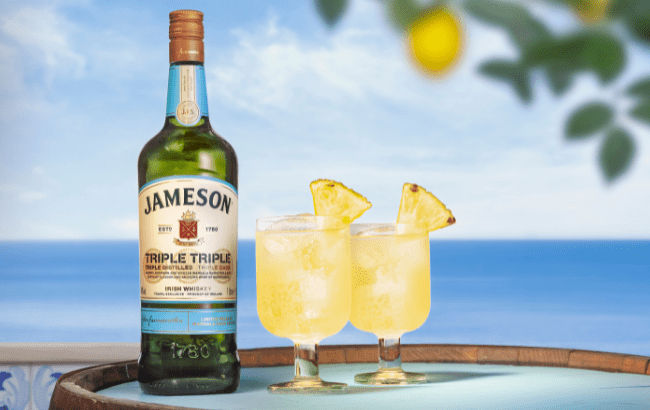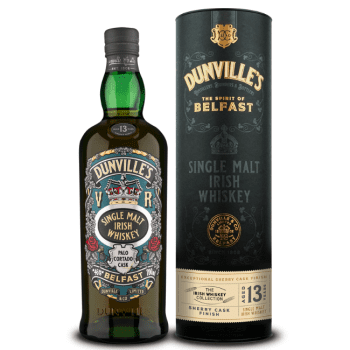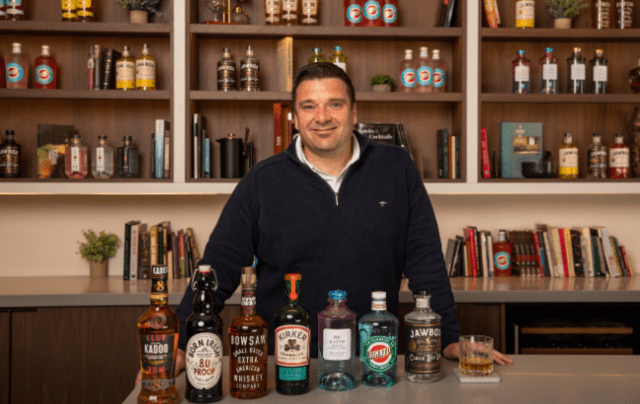Is there room for small Irish whiskey brands in GTR?
While big Irish whiskey brands are popular in duty free, smaller independents are having to fight to be seen.

Cast your eyes on the shelves of duty free stores and you’ll see some familiar faces in Irish whiskey, namely the likes of Jameson, Tullamore Dew, and Bushmills.
These brands all have major parent companies behind them that have the resources and established partnerships with duty free operators through their portfolio of spirits already in global travel retail (GTR), to enable them to grab a bigger piece of the pie. But how can the smaller brands break through, and is there space in the channel for a more diverse offering when it comes to whiskeys from the Emerald Isle?
Independent Spirit
It’s a new area of business for independently run Echlinville, the second biggest distillery in Northern Ireland after Proximo Spirits-owned Bushmills.
In April 2025, Echlinville was named the first ‘Distillery of the Month’ at Belfast International Airport’s new duty free shop, operated by Lagardère.
Every day in April, the store’s International Tasting Bar offered samples of Echlinville’s range, including its Dunville’s and Old Comber whiskeys, providing a major boost to a relative newcomer to the channel.
This month, Echlinville will launch a GTR-exclusive, 13-year-old Palo Cortado cask-finished expression for its Dunville’s brand, exclusively at Dublin Airport.
“Our goal was always to open up fresh new markets, focus on traditional distribution and opening markets globally, and then narrow it down to 10, then five where you really try to grow,” explains Stephen Magennis, Echlinville’s head of global sales. “That’s been our model for the past five years. But over the past two and a half we started to focus domestically on travel retail.”
Last year the company partnered with FreeWorld Brands on its expansion in travel retail, with the aim of targeting Ireland first before going further afield, Magennis says.
“Travel retail has always been huge for Irish whiskey but it’s been dominated by the big guy,” he says, highlighting category leader Jameson, owned by Pernod Ricard.
“If you don’t have the funds to do activations then you won’t get a return. A big problem we have is the complete lack of awareness of Irish whiskey.”
He notes that while Jameson has “done a lot of work for Irish whiskey”, the category has become “a bit more cannibalised”, with buyers looking for the “best margin” over the best brand.
Sean McNaughten, founder of FreeWorld Brands, believes the category remains “super-undeveloped” in the channel. Barry Geoghegan, founder of Duty Free Global, says the Irish whiskey business is “having a tough time as there are so many distillers”. Duty Free Global looks after Powerscourt Distillery and Sazerac’s Paddy Irish whiskey brand. He explains: “Basically, there’s about 40-42 distilleries in Ireland and they all want to sell to the same market – the big Irish-American heritage, that’s the number-one focus market. And historically, the key markets outside of there would be the UK, France, Germany and Ireland.”
In terms of emerging markets, Geoghegan says Irish whiskey “outperforms other whiskies in Eastern Europe”, particularly in countries such as Bulgaria and the Czech Republic. “The border-shop business in Eastern Europe has always been strong for Irish whiskey, and that continues now.” However, he warns the situation in Ukraine has made that market “a little bit more problematic in the last two years”.

Duty Free Growth
Speaking about Paddy Irish whiskey, he notes the brand has been “doing very well” in the channel, particularly in Dublin Airport’s Terminal 2 where American flights depart.
However, this year, the brand’s growth has come from the UK and Ireland, driven by the UK’s four-litre duty free allowance for spirits (22% ABV and above). The cruise and ferry business through DFDS has also been “absolutely on fire” for Paddy’s, becoming its “biggest chunk of business”. He notes the brand has benefitted from offering a “value proposition” and different formats, from miniatures to half-sized bottles.
“From a performance point of view, I would say the brand is in growth because it was underrepresented historically, and that doesn’t reflect the market, because the market is not in growth.”
Forecasts suggest the category in GTR will return to growth. Volumes of Irish whiskey in GTR fell by 3% in 2023, according to data from IWSR Drinks Market Analysis, which could not provide 2024 figures in time for this report. However, it estimates a compound annual growth rate (CAGR) of 5% for the category in GTR from 2023 to 2028.
Geoghegan believes there is still a “great opportunity” for premium-plus whiskey, pointing to Powerscourt’s Fercullen brand, which “has a point of difference” by focusing on grain whiskey rather than “following the pot still trend”. He notes that Fercullen’s 15-year-old whiskey will be the driver for the brand in travel retail, having already secured multiple listings around the world. The brand is seeing success in Ireland, the Middle East and South America.
He makes several points about the channel, namely that without a distribution partner (citing examples such as Bacardi with Teeling, and Brown-Forman with Slane), brands are “really limited in GTR because [duty free operators] are likely to take Jameson as the brand leader, plus one or two other brands”.
He adds: “If it’s logistically difficult to supply, it’s much easier for [buyers] to work through an existing brand that has already got a portfolio, since it’s just consolidation. So what’s challenging for Irish whiskey is the limited route-to-market opportunities.”
While the wider category was in decline in 2023, Jameson is proving that it can overcome sector challenges. In the 12 months to March 2025, Jameson’s GTR sales rose by 3%, while stablemate single pot still Redbreast soared by 27%, albeit from a low base.

“Jameson is one of those brands that despite the history and maturity, it has continued to grow from strength to strength over the past 12 months,” says Rae Gibson, brand director of premium and super- premium spirits at Pernod Ricard GTR.
“It has seen exceptional performance in more mature markets like Europe and the Americas. But more impressively it is now looking at regions like India, the Gulf and Asia. Because of its tremendous popularity in domestic markets we’re seeing really strong growth within travel retail as well.”
The company is also focused on “accelerating” Redbreast, with a commitment to major markets in Europe and the Americas, as well as emerging markets like Asia (namely India) and the Gulf. Jameson increased by 30% in India and the Middle East travel retail in the year to March 2025, and Redbreast rose by 200% in the two regions. With Jameson, the company focuses on St Patrick’s Day as a key activation period, and is aiming to encourage shoppers to trade up from the flagship whiskey to releases such as the brand’s Triple Triple expression.
GTR exclusives remains an important part of Pernod Ricard’s strategy in the channel. In March, the Jameson Triple Triple range was extended with a Marsala cask-finished whiskey, and last year, the company unveiled Redbreast Cuatro Barriles in partnership with ARI, which “sold 18,000 bottles in its first nine months”, outselling Jameson.
Gibson notes that the main challenge for the category is competition, alongside the lack of recognition for Irish whiskey in the channel. “You walk into a store, and there are so many categories and so many brands for people to choose from,” she says. “So it is about trying to stand out. And there’s still a job to be done in terms of educating a lot of shoppers on Irish whiskey, its quality and craftsmanship especially.
“There’s just so much recognition and understanding of the Scotch category that there’s still a job for us to do to educate consumers on the incredible quality of Irish whiskeys.”
Industry insights

Ryan McFarland, chief commercial & strategy officer, Drinksology Kirker Greer:
How do you position your brand in travel retail compared to domestic markets?
In travel retail, we tend to lean more heavily into storytelling and provenance, particularly with a brand like Kirker Irish Whiskey, which is rooted in heritage and crafted for discovery. While domestic markets allow us to build consistency and loyalty, GTR gives us a platform to introduce the brand in a more immersive, experiential way, it’s a first impression for many international consumers, so we tailor our messaging accordingly.
How do you determine pricing strategy in duty-free versus duty-paid environments?
It’s a careful balance between maintaining brand integrity and offering the traveller a compelling reason to engage with our products. In duty-free, there’s a strong expectation of value – not necessarily just in terms of price, but in exclusivity, presentation and story. That’s why we develop specific releases for the channel that can’t be found elsewhere.
A perfect example is the Kirker Four Province Blend Limited Release, which we’ve created exclusively for Aer Rianta. It’s a blend that brings together spirits from all four provinces of Ireland – Ulster, Munster, Leinster and Connacht – featuring single malt, grain, and pot still whiskeys matured in a mix of first-fill bourbon, full Oloroso, and Shiraz casks. It’s non-chill filtered, bottled at 45% ABV, and offers a rich, layered profile that rewards discovery, all key qualities that resonate with the global traveller.
By crafting something so specific to the duty-free environment, we can justify a premium positioning while also offering added value through rarity and authenticity. At the same time, we ensure this doesn’t compromise 2 pricing integrity in domestic markets by maintaining clear segmentation and purpose-built SKUs. It’s a strategy that lets us celebrate our creative freedom in travel retail while protecting the long-term value of our brands.
Are you expanding into cruise ships, border stores or inflight sales?
Yes, we’re actively exploring opportunities in all three channels. We’ve seen particular interest in inflight listings for Kirker Shamrock, as its smooth, accessible profile makes it ideal for that environment. Cruise retail is also exciting for us – those passengers often have more time to engage with new spirits and are open to trying something authentic and craft-led. Border stores remain a strategic target as well, especially in Europe.
How are you preparing for the increasingly omni-channel nature of GTR?
We see omni-channel as a major opportunity to create a more joined-up brand experience. It’s no longer just about the shelf, it’s about digital touch points before, during and after travel. We’re investing in content that supports Kirker Irish Whiskey’s discovery journey online, making sure it’s visible through travel retail e- commerce, QR-led experiences, and social engagement that ties into the physical retail space. The aim is to make it easy and intuitive for travellers to explore and buy into the brand, wherever they are.
What trends are you seeing among international travellers in terms of purchase behaviour?
There’s a definite shift towards premiumisation, but it’s not just about price. It’s about craft, transparency and a compelling backstory. Travellers are also increasingly curious and more experimental, especially with regional spirits or lesser-known brands. For us, that’s a sweet spot – Kirker Irish Whiskey appeals to those looking for a whiskey with a distinctive Irish identity, but also a touch of the unexpected. Convenience and giftability remain important, too, which is why we focus on eye-catching design and clear product messaging.
Related news
EU-India deal positive news for Irish whiskey
